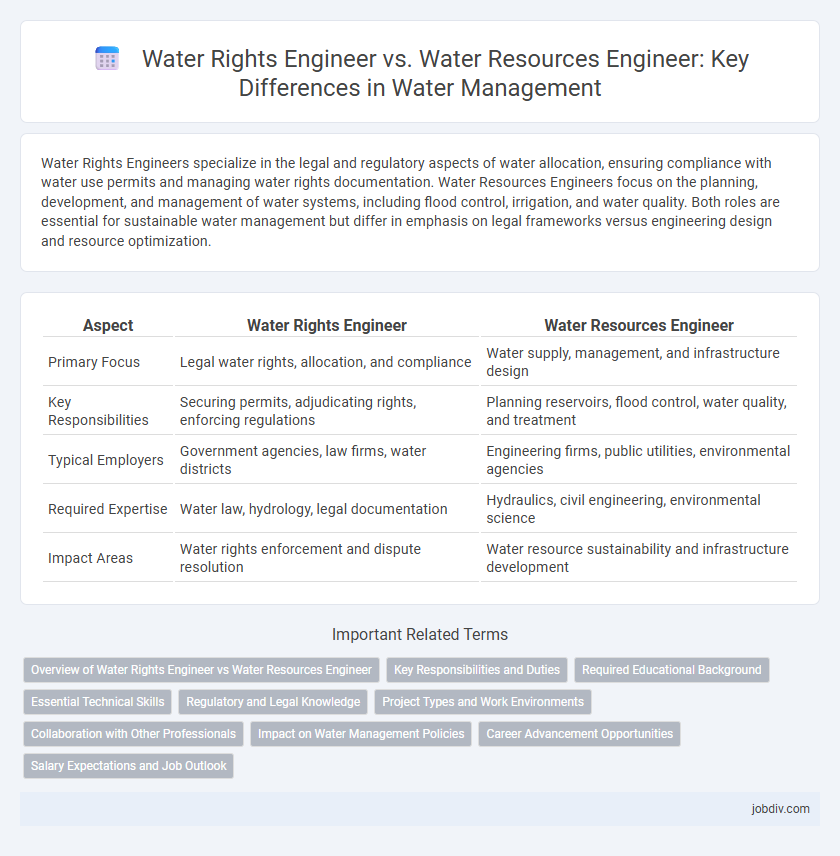Water Rights Engineers specialize in the legal and regulatory aspects of water allocation, ensuring compliance with water use permits and managing water rights documentation. Water Resources Engineers focus on the planning, development, and management of water systems, including flood control, irrigation, and water quality. Both roles are essential for sustainable water management but differ in emphasis on legal frameworks versus engineering design and resource optimization.
Table of Comparison
| Aspect | Water Rights Engineer | Water Resources Engineer |
|---|---|---|
| Primary Focus | Legal water rights, allocation, and compliance | Water supply, management, and infrastructure design |
| Key Responsibilities | Securing permits, adjudicating rights, enforcing regulations | Planning reservoirs, flood control, water quality, and treatment |
| Typical Employers | Government agencies, law firms, water districts | Engineering firms, public utilities, environmental agencies |
| Required Expertise | Water law, hydrology, legal documentation | Hydraulics, civil engineering, environmental science |
| Impact Areas | Water rights enforcement and dispute resolution | Water resource sustainability and infrastructure development |
Overview of Water Rights Engineer vs Water Resources Engineer
Water Rights Engineers specialize in legal and regulatory aspects of water use, focusing on securing and managing water rights permits and compliance with water laws. Water Resources Engineers design and implement systems for water supply, flood control, and wastewater management, emphasizing infrastructure, hydrology, and environmental impact. Both roles require expertise in water management but differ in scope, with Water Rights Engineers concentrating on legal frameworks and Water Resources Engineers on technical solutions.
Key Responsibilities and Duties
Water Rights Engineers specialize in securing, managing, and legally defending water use permits and water rights to ensure compliance with state and federal regulations. Water Resources Engineers focus on designing and implementing systems for water supply, flood control, and watershed management, emphasizing hydrological analysis and infrastructure development. Both roles require expertise in water laws and environmental regulations, but Water Rights Engineers prioritize legal frameworks while Water Resources Engineers concentrate on technical solutions for water management.
Required Educational Background
Water Rights Engineers typically require a degree in civil engineering, environmental engineering, or water resource management with specialized coursework or certification in water law and water rights policy to navigate legal frameworks governing water use. In contrast, Water Resources Engineers emphasize a broader engineering foundation, often holding degrees in civil or environmental engineering with extensive training in hydrology, hydraulics, and watershed management to design and manage water systems. Both roles benefit from advanced understanding of environmental regulations, but Water Rights Engineers focus more on legal and regulatory expertise, while Water Resources Engineers prioritize technical and engineering skills in water system analysis and infrastructure design.
Essential Technical Skills
Water Rights Engineers specialize in legal frameworks, hydrological data analysis, and water allocation modeling to ensure compliance with water laws and policies. Water Resources Engineers focus on designing infrastructure like dams, levees, and water treatment systems, utilizing skills in hydraulic modeling, environmental impact assessment, and groundwater management. Both require proficiency in GIS software, CAD tools, and comprehensive knowledge of water quality standards and regulatory requirements.
Regulatory and Legal Knowledge
Water Rights Engineers specialize in the legal frameworks and regulatory compliance related to water usage, ensuring adherence to water allocation laws and permits. Water Resources Engineers concentrate on designing and managing hydraulic systems, focusing more on technical and environmental aspects rather than legal constraints. Regulatory expertise differentiates Water Rights Engineers by their proficiency in navigating water rights laws, adjudications, and water use permits essential for water allocation and conflict resolution.
Project Types and Work Environments
Water Rights Engineers primarily focus on legal aspects of water allocation, working on projects involving water permits, compliance, and regulatory frameworks, often collaborating with government agencies and law firms. Water Resources Engineers handle hydraulic modeling, flood risk assessments, and infrastructure design for water supply or stormwater management projects, frequently operating in consulting firms, municipal agencies, or environmental organizations. Both professions contribute to sustainable water management, but Water Rights Engineers emphasize legal entitlement and water use policies, while Water Resources Engineers concentrate on technical and environmental water resource planning.
Collaboration with Other Professionals
Water Rights Engineers collaborate closely with legal experts, government agencies, and water users to navigate water allocation laws and ensure compliance with regulatory frameworks. Water Resources Engineers work alongside environmental scientists, urban planners, and civil engineers to design sustainable water management systems and infrastructure projects. Both professionals integrate multidisciplinary expertise to optimize water use, protect ecosystems, and support community needs.
Impact on Water Management Policies
Water Rights Engineers specialize in legal frameworks governing water allocation and compliance, directly influencing water management policies through regulatory enforcement and policy design. Water Resources Engineers focus on the technical planning, development, and sustainability of water systems, impacting policies by providing data-driven insights and infrastructure solutions. Together, their roles shape comprehensive water management strategies that balance legal entitlements with efficient resource utilization.
Career Advancement Opportunities
Water Rights Engineers specialize in legal frameworks and regulatory compliance related to water use, offering career advancement in policy development, water law consultancy, and government agencies; Water Resources Engineers focus on designing and managing water systems, leading to opportunities in infrastructure projects, environmental impact assessment, and sustainable resource management. Expertise in hydrology, environmental regulations, and geographic information systems (GIS) is crucial for both roles, but Water Resources Engineers often advance through technical project leadership and innovation in water treatment technologies. Professionals with interdisciplinary skills combining legal knowledge and engineering principles tend to access broader leadership roles in water management organizations and consulting firms.
Salary Expectations and Job Outlook
Water Rights Engineers typically command salaries ranging from $70,000 to $110,000 annually, reflecting their specialization in legal and regulatory aspects of water use. Water Resources Engineers earn between $75,000 and $120,000 per year, with broader responsibilities in hydrology, infrastructure design, and environmental management. The job outlook for both roles remains strong, driven by increasing demand for sustainable water management amid climate change and population growth.
Water Rights Engineer vs Water Resources Engineer Infographic

 jobdiv.com
jobdiv.com